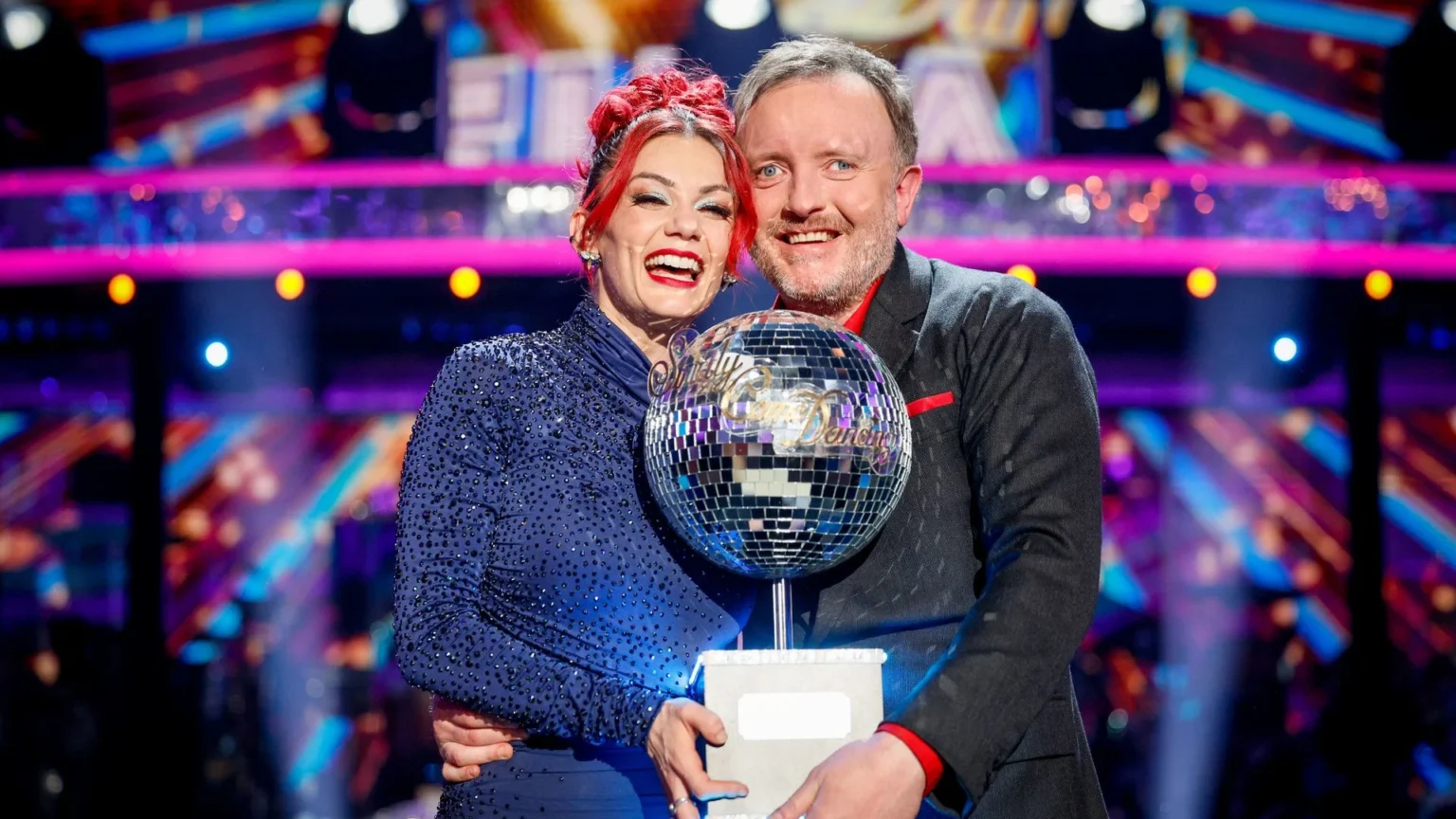Chris McCausland Must Return Strictly Trophy Despite Historic Win
Introduction
When comedian Chris McCausland lifted the Glitterball Trophy on Strictly Come Dancing 2024, it marked a historic milestone in the show’s glittering history. As the first blind contestant to win, McCausland captured the nation’s heart with his resilience, humour, and artistry alongside professional partner Dianne Buswell. Yet, despite this landmark victory, headlines declared: Chris McCausland must return Strictly trophy despite historic win. The bittersweet detail surprised many fans, sparking discussions about what winners really get to keep after their Strictly journey.
This article takes a deep dive into McCausland’s unforgettable Strictly season, the story behind the Glitterball Trophy, and why winners like Chris don’t actually get to keep it. Along the way, we’ll explore how his achievement is reshaping conversations about disability, representation, and the true meaning of victory.
Chris McCausland’s Historic Strictly Win
Chris McCausland, a well-known stand-up comedian and actor from Liverpool, became an inspiration long before he set foot on the Strictly dance floor. Living with retinitis pigmentosa, a degenerative eye condition that causes blindness, Chris has spoken openly about the challenges of navigating life without sight. When he joined Strictly Come Dancing in 2024, many wondered how he would handle the demanding choreography and intricate routines.
Week after week, Chris and his partner Dianne Buswell delivered performances that showcased not just technical skill, but also remarkable storytelling and emotion. Their dances weren’t just steps set to music; they were moments of connection and courage. From the cha-cha to a poignant waltz where Chris walked unsighted across the floor, the pair consistently wowed judges and audiences alike.
By the grand finale, Chris McCausland and Dianne Buswell had not only secured a place in the show’s history books but also inspired countless viewers by proving that disability is no barrier to excellence.
Why Chris McCausland Must Return Strictly Trophy Despite Historic Win
The headline that “Chris McCausland must return Strictly trophy despite historic win” might sound shocking, but it’s actually standard practice on Strictly Come Dancing. The full-sized Glitterball Trophy, a dazzling icon of the BBC’s Saturday night hit, is never permanently awarded to winners. Instead, it is held briefly on the night of the final for celebratory photos and emotional speeches. Soon after, it must be returned to the production team.
Winners, including McCausland, don’t leave empty-handed. They receive a miniature replica Glitterball Trophy, often described as being about the size of a grapefruit. While far smaller, it serves as a lasting memento of their journey and victory.
This practice has been confirmed by former winners like Bill Bailey, Ore Oduba, and Harry Judd, who have spoken with good humour about the quick handover of the trophy after their big moment. Chris McCausland’s win was no different, though the symbolism of him being the first blind winner made the return of the big trophy feel particularly bittersweet to many fans.
The Glitterball Replica: What Winners Really Keep
So, why does Chris McCausland have to return the Glitterball Trophy despite his historic win? The answer lies in tradition and practicality.
- Tradition: Since its early seasons, Strictly has kept the full-size trophy as part of the show’s heritage, reusing it each year as the ultimate prize.
- Practicality: The trophy is expensive to produce and is closely tied to the brand identity of Strictly. By keeping it in-house, the BBC preserves continuity.
- Replica Gift: Winners still leave with a personal trophy, small enough to be proudly displayed at home.
Fans may feel this undermines the win, but in reality, the true prize is the journey and the prestige of joining a select group of champions. For McCausland, the replica is a symbol of a much larger achievement.
Representation and Inclusivity in Reality TV
Beyond the trophy debate, Chris McCausland’s victory has ignited conversations about representation in mainstream television. By competing without compromise, he showed that disability does not define talent. His routines highlighted how inclusivity can create powerful, emotional performances that resonate universally.
The Scottish Parliament even passed a motion celebrating his victory, praising the message that “disability is no barrier to excellence.” Such recognition underscores how television can influence cultural perceptions and drive positive change.
Public and Parliamentary Recognition for McCausland
Chris McCausland’s impact went far beyond the dance floor:
- Scottish Parliament Honour: Politicians praised his courage and success, acknowledging the importance of inclusive representation on mainstream media.
- BAFTA Award: The pair’s iconic routine, featuring Chris walking unaided and unsighted, won the BAFTA for Memorable Moment in 2025.
Such recognition demonstrates that his journey wasn’t just about winning a TV competition—it was about shifting narratives around disability and visibility.
How This Win Reshapes Strictly Come Dancing
The fact that Chris McCausland must return the Strictly trophy despite his historic win doesn’t diminish the seismic impact of his achievement. Instead, his season redefined what is possible on the show.
For years, Strictly has championed diversity—casting contestants of different ages, backgrounds, and abilities. But McCausland’s win was the first to centre disability representation so strongly. It sets a precedent for future seasons, encouraging producers to continue pushing boundaries and creating an inclusive platform.
Fan Reactions to the Trophy Tradition
Fans reacted with a mix of humour and frustration to learning that Chris McCausland had to return the Glitterball Trophy despite his historic win. Social media buzzed with questions like:
- “Why can’t he keep the real one after making history?”
- “Surely the BBC can afford to give him a bigger replica!”
- “It’s about time Strictly updated this tradition.”
While some see the replica as sufficient, others argue that McCausland’s barrier-breaking win deserved an exception. The debate highlights how deeply viewers felt invested in his journey and how symbolic the trophy is.
FAQs
1. Why must Chris McCausland return the Strictly trophy despite historic win?
Because the Glitterball Trophy is reused each year. Winners, including McCausland, receive a smaller replica instead.
2. What did Chris McCausland achieve on Strictly?
He became the first blind contestant to win the competition, partnering with Dianne Buswell and inspiring millions.
3. Did Chris McCausland receive any recognition outside Strictly?
Yes, he was honoured by the Scottish Parliament and won a BAFTA Memorable Moment award.
4. How did fans react to the trophy situation?
Fans expressed surprise and some frustration, with many calling for the BBC to give winners a full-sized version of the Glitterball.
5. What’s next for Chris McCausland?
Beyond Strictly, Chris continues to perform stand-up, appear on television, and advocate for disability representation in media.
Conclusion
The story of how Chris McCausland must return Strictly trophy despite historic win may sound bittersweet, but it’s a reminder that the true prize isn’t the Glitterball itself—it’s the journey, the recognition, and the impact made on millions of viewers. McCausland’s triumph represents not just a personal victory, but a step forward for inclusivity in British television.
While the full-sized trophy may return to the BBC vaults, the legacy of Chris McCausland’s season will shine far brighter. His courage, humour, and artistry will continue to inspire, proving that barriers can be broken and history can be made on the dance floor.
What do you think—should Strictly Come Dancing winners like Chris McCausland be allowed to keep the full-sized Glitterball Trophy? Share your thoughts in the comments and join the conversation about this historic win! Michael Portillo Net Worth

